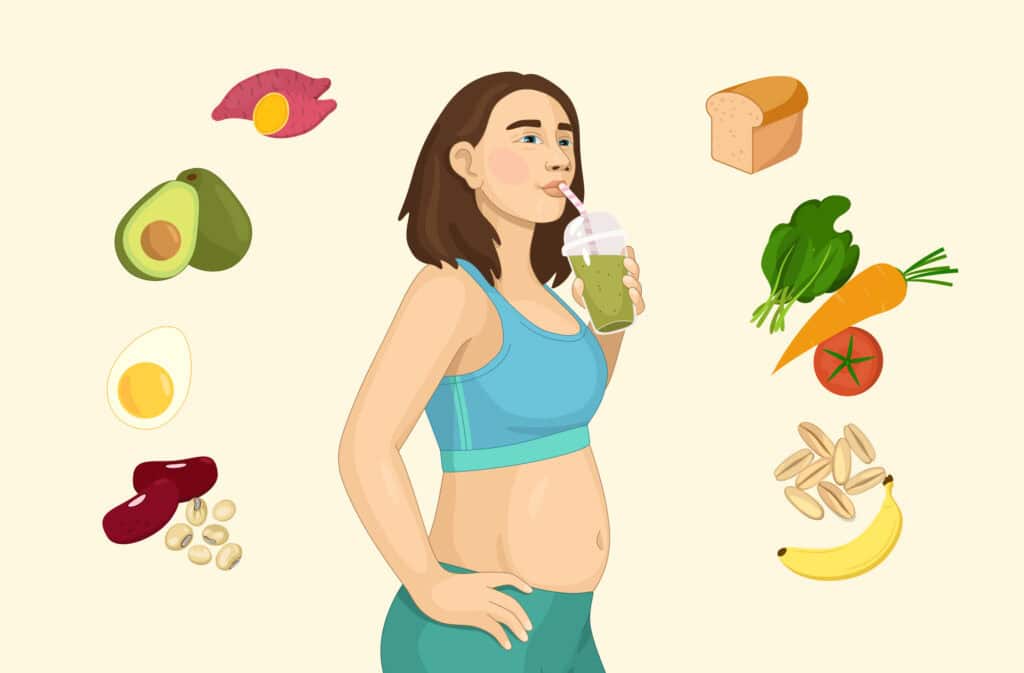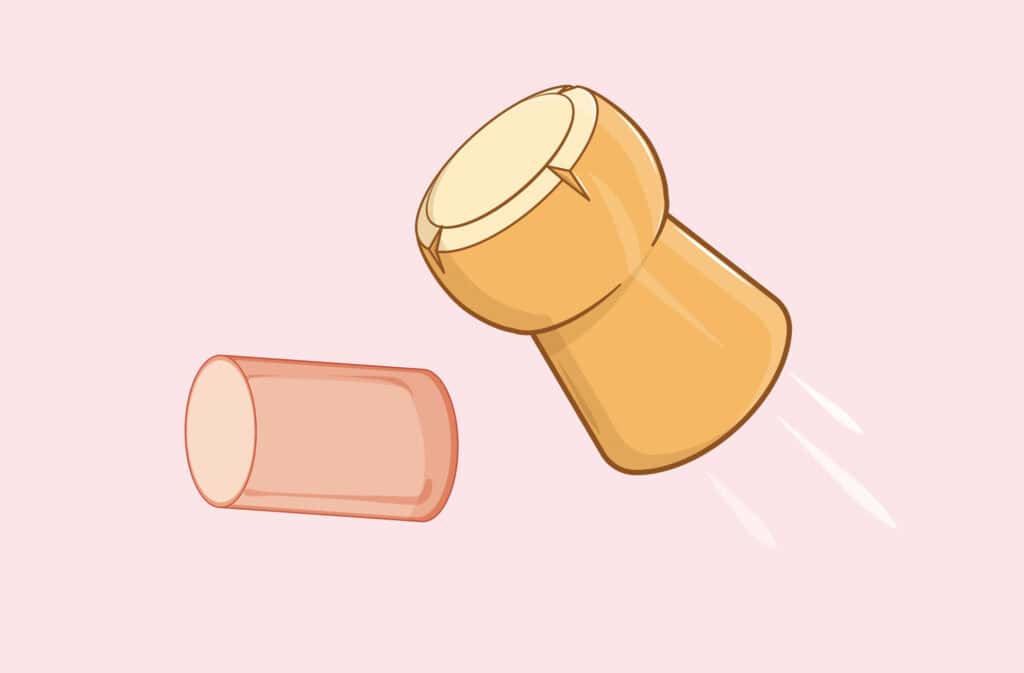Femia > Health Library > Pregnancy > Pregnancy health > Top foods to fight nausea during pregnancy: A first trimester survival guide
Top foods to fight nausea during pregnancy: A first trimester survival guide

- Updated Feb 11, 2025
- Published
CRAFTED BY HUMAN
Crafted by human At Femia, we provide accurate and up-to-date information at every stage of your journey, from trying to conceive, pregnancy and postnatal support. All content is created by a real person based on in-depth research and own professional experience. Femia ensures that you will receive expert advice, strict accuracy and a personalized approach from our authors/medical experts. Learn more about our editorial policy.
FACT CHECKED
Fact checked At Femia Health, we maintain the highest standards of editorial excellence in delivering content focused on helping you conceive, guiding you through pregnancy, and supporting you postpartum. Explore our content review principles to learn how we ensure the accuracy and quality of our health and lifestyle tips for every stage of your journey.
Many women experience nausea and vomiting during the early weeks of pregnancy. Eat frequent, small meals to regulate blood sugar, and avoid foods that trigger sickness. You can reduce your symptoms by eating high-carb, low-fat foods, such as potatoes, pasta, and rice. On the other hand, avoid overly sweet or greasy foods, which may trigger nausea.
Pregnancy sickness begins as early as week four and often persists throughout the first trimester. According to a 2011 article published in Gastroenterology Clinics of North America, pregnancy nausea and sickness affects between 70 and 80 percent of pregnant people.
designed just for you
Personalized meal plans, symptom tracking, and more with the Femia
Why is it called “morning sickness”?
The term ”morning sickness” is falling out of favor, because nausea can strike any time, day and night. While it is most common to feel nauseous in the morning, many sufferers also experience pregnancy nausea at night. Some women feel queasy all day long.
Pregnancy sickness is no fun and can have a significant impact on your daily routine. For most women, pregnancy nausea disappears by the midpoint of the pregnancy, though a small minority continue to suffer for the duration of the pregnancy.
What causes pregnancy nausea
Hormone levels change rapidly during the early weeks of pregnancy, which is thought to cause pregnancy nausea. A 2023 animal study published in Nature found that a pregnancy hormone produced by the placenta, GDF15, is responsible for this nausea. The level of pregnancy sickness is related to the amount of GDF15 in the bloodstream and maternal sensitivity to this hormone.
Who suffers from pregnancy nausea
Not all women experience pregnancy nausea and sickness. You are more likely to suffer from pregnancy sickness if:
- you are carrying twins (or more)
- you had it during a previous pregnancy
- you suffer from motion sickness
- pregnancy sickness runs in your family
- this is your first pregnancy
- you have a BMI of 30 or more
👉Find out more: Can you drink coffee while pregnant? Caffeine safety, limits, and benefits explained
When to worry
Around three in 100 pregnant women will experience severe pregnancy sickness, known as hyperemesis gravidarum. This condition stops you from being able to eat and drink normally and can lead to dehydration. Hyperemesis gravidarum can be severe, so consult your healthcare provider if you experience:
- Dark colored urine
- Dizziness when you stand
- Blood in your vomit
- Pain or cramping
- Weightloss over 3 kg
👉Find out more: Third-trimester nausea: Why it returned and how to find relief
What helps morning sickness in the first trimester
Not being able to eat or enjoy food for weeks at a time is tough, and you will need a support system in place to help you through.
Get plenty of rest
It’s common for morning sickness to be accompanied by early pregnancy fatigue. Getting plenty of rest during your pregnancy is vital, as you need a lot of energy to grow a human, and exhaustion can worsen nausea. If your body is telling you it needs rest, listen.
Drink plenty of water
To avoid dehydration, make sure you’re drinking plenty of water. Some women find adding a touch of lemon to their water makes it easier to drink, and others add ice to ensure the water tastes refreshing. A 2014 clinical trial published in the Iranian Red Crescent Medical Journal found that inhaling lemon aromatherapy decreased nausea symptoms in pregnant women.
👉Find out more: Can you drink tea while pregnant? Safe teas, risks, and tips for enjoying tea during pregnancy
Use ginger
Ginger is often recommended as a food that eases pregnancy nausea. A 2016 review published in Integrative Medicine Insights found that ginger poses no risks during pregnancy and is an effective and affordable way to reduce pregnancy nausea. You can drink ginger tea, drink gingerade, or add ginger to your meals.
Use Acupressure
Acupressure can ease nausea symptoms, so consider wearing an acupressure band or bracelet or manually applying pressure to help reduce pregnancy nausea. A 2022 study published in the International Journal of Environmental Research & Public Health found that acupressure can even reduce symptoms in women suffering from hyperemesis gravidarum, a severe form of pregnancy sickness.
Breakfast foods that fight nausea during pregnancy
“Morning sickness” is named as such because many women find that their nausea is worse in the mornings. This can be due to low blood sugar after not eating all night, so keeping a small snack by your bed can help stabilize your blood sugar levels first thing. Try dry crackers or a nutritious breakfast bar for something healthy and light.
When it comes time for breakfast, plain, easy-to-digest foods are a good option for first thing in the morning when your nausea is likely at its worst. Here are some breakfast foods that fight nausea during pregnancy in the first trimester:
- Plain toast
- Plain crackers
- Oatmeal
- Plain yogurt
- Fortified breakfast cereals (opt for a low-sugar variety)
👉Find out more: Can you eat pepperoni when pregnant? Safety tips for pregnancy
Best foods to eat when nauseous in the morning
While you may need to focus on foods you can keep down, it’s also worth considering the nutritional content of any food you eat. While you may end up with a limited diet of plain foods to avoid nausea, it’s also essential to include some nutrient-rich options. High-protein foods can boost your energy levels while keeping nausea at bay. Additionally, Vitamin B6 has been shown in to be effective in easing nausea symptoms. You can obtain Vitamin B6 from foods like bananas, chicken, and chickpeas, making these good choices when feeling nauseous.
Here are some excellent breakfast foods that contain necessary vitamins and minerals:
- Banana
- Simple fruit salad
- Plain yogurt with applesauce
- Oatmeal with dried ginger
- Hard-boiled eggs
- Mashed avocado on toast
- Beans on toast
Nausea at night: Foods that help in the evening
If your first trimester nausea is worse at night, try switching your meals. Overloading your stomach can trigger nausea after eating in pregnancy, so opt for a larger lunch and choose light dinners that are less likely to aggravate your sickness. High-protein meals help you to stay full and can reduce nausea.
Lying down after eating can make nausea worse, so try staying upright for an hour after dinner to let your food digest. This may mean you need to bring your dinnertime forward, especially if you’re struggling with pregnancy fatigue.
Here are some easy, light dinners to ease your sickness:
- Homemade soups and broths
- Chicken and quinoa salad
- Rice and bean salad
- Roast sweet potato and rice
- Chicken or tofu with boiled potatoes and steamed vegetables
👉Find out more: Can pregnant women eat sushi? What you need to know about sushi during pregnancy
Hydration and snacks to soothe pregnancy nausea
Hydration is crucial for a healthy pregnancy, so drink plenty throughout the day. Staying hydrated can help keep nausea at bay.
Drink plenty of water
This can be tough if you’re struggling with morning sickness, but taking small sips throughout the day can help you reach your hydration goal. According to the American College of Obstetricians and Gynaecologists, you should drink eight to 12 cups of water daily. Add a slice of lemon or ice to your water for a refreshing drink.
Try electrolyte drinks and smoothies to increase your fluid intake
Some women drink electrolyte drinks during the first trimester to help stay hydrated. Plus, if you find it easier to keep down drinks rather than solid food, a fruit smoothie is a great way to sneak some extra nutrients into your body. Cold food is less likely to trigger your food aversions, so try making your fruit and vegetable smoothies into ice lollies to enjoy on a hot day.
Opt for caffeine-free hot drinks
If you want to replace caffeinated warm drinks, try ginger or peppermint tea. A warm drink can be soothing, especially if you’re feeling down because of your pregnancy symptoms. If you’re struggling to drink, choose hydrating snacks such as watermelon slices, cucumber sticks, or a juicy orange.
Eat little and often
Eating small, frequent meals is recommended to ease pregnancy nausea. Try keeping plain crackers at hand so you can snack throughout the day. Dried fruits, nuts, and seeds are other nutrient-rich options for your growing baby. Apple slices with peanut butter or hummus and crudites are perfect afternoon snacks.
👉Find out more: Can you eat pineapple while pregnant? Facts, benefits, and myths
Choose foods that reduce nausea
Vitamin B6 has been shown to ease nausea symptoms, so air-fried chickpeas are a great snack. For an occasional sugary treat, keep a packet of ginger biscuits in your handbag for when nausea hits.
designed just for you
Personalized meal plans, symptom tracking, and more with the Femia
What foods to avoid to prevent pregnancy nausea
If you know a food has made you sick before, you might want to avoid it for a while. Many women also find that foods with strong odors trigger their nausea. If cooking smells are making you sick, ask your partner to take on the role of head chef for a while.
Common pregnancy nausea triggers include:
- Spicy foods, which can trigger heartburn as well as nausea.
- Greasy foods, such as takeaway pizza and spicy curries, which might exacerbate your sickness.
- Overly sweet foods— as well as greasy foods, foods high in sugar can make nausea worse.
Questions from Femia community
Can prenatal vitamins make nausea worse?
Yes, some prenatal vitamins can make nausea worse, especially if they contain iron. However, prenatal vitamins are crucial for your baby’s health, so speak to your OBGYN for advice before making any changes to your supplement schedule.
Does morning sickness mean I have a healthy pregnancy?
No, morning sickness doesn’t indicate whether a pregnancy is healthy or unhealthy. Around one in five women escape morning sickness altogether, but that’s no indication that anything is wrong with their babies.
Can ginger supplements replace fresh ginger for nausea relief?
Yes, you can take ginger supplements for nausea relief. If you don’t like ginger, you might prefer a ginger supplement. Consult your healthcare provider before taking new supplements during pregnancy.
The bottom line
If pregnancy nausea is impacting your life, you’re losing weight, or you are worried about meeting your body’s nutritional needs during pregnancy, speak to your healthcare provider. Prescription anti-sickness medications can combat nausea symptoms, so talk to your doctor to determine whether you might be a suitable candidate.
Unfortunately, there is no definitive answer when it comes to what foods will help fight nausea. For example, some people find carbonated water helps fight nausea, whereas for others, this worsens the symptoms. Pregnancy sickness is unique for everyone, so keep trying until you find what foods work for you.
References
- Lee, Noel M., and Sumona Saha. “Nausea and Vomiting of Pregnancy.” Gastroenterology Clinics of North America, vol. 40, no. 2, 2011, pp. 309-34. doi:10.1016/j.gtc.2011.03.009. https://www.ncbi.nlm.nih.gov/pmc/articles/PMC3676933/.
- Fejzo, M., Rocha, N., Cimino, I., et al. “GDF15 Linked to Maternal Risk of Nausea and Vomiting during Pregnancy.” Nature, vol. 625, 2024, pp. 760–767. https://doi.org/10.1038/s41586-023-06921-9.
- Yavari Kia, Parisa, et al. “The Effect of Lemon Inhalation Aromatherapy on Nausea and Vomiting of Pregnancy: A Double-Blinded, Randomized, Controlled Clinical Trial.” Iranian Red Crescent Medical Journal, vol. 16, no. 3, 2014, e14360. doi:10.5812/ircmj.14360. https://www.ncbi.nlm.nih.gov/pmc/articles/PMC4005434/.
- Lete, Iñaki, and José Allué. “The Effectiveness of Ginger in the Prevention of Nausea and Vomiting during Pregnancy and Chemotherapy.” Integrative Medicine Insights, vol. 11, 2016, pp. 11-7. doi:10.4137/IMI.S36273. https://www.ncbi.nlm.nih.gov/pmc/articles/PMC4818021/.
- Mohd Nafiah, Nor Azila, et al. “Effect of Acupressure at P6 on Nausea and Vomiting in Women with Hyperemesis Gravidarum: A Randomized Controlled Trial.” International Journal of Environmental Research and Public Health, vol. 19, no. 17, 2022, Article 10886. doi:10.3390/ijerph191710886. https://www.ncbi.nlm.nih.gov/pmc/articles/PMC9518577/.
- Jayawardena, Ranil, et al. “The Effects of Pyridoxine (Vitamin B6) Supplementation in Nausea and Vomiting during Pregnancy: A Systematic Review and Meta-Analysis.” Archives of Gynecology and Obstetrics, vol. 308, no. 4, 2023, pp. 1075-1084. doi:10.1007/s00404-023-06925-w. https://pubmed.ncbi.nlm.nih.gov/36719452/.

How big your baby is? Explore our guide to track your baby’s size compared to fruit week by week and learn about key developmental milestones during pregnancy.

Wondering if sushi is safe during pregnancy? Learn why raw fish should be avoided and discover pregnancy-safe sushi options, including cooked and vegetarian rolls.

Learn to distinguish between mucus plug and discharge during pregnancy. Understand the appearance, timing, and significance of each. Expert insights from Femia.

